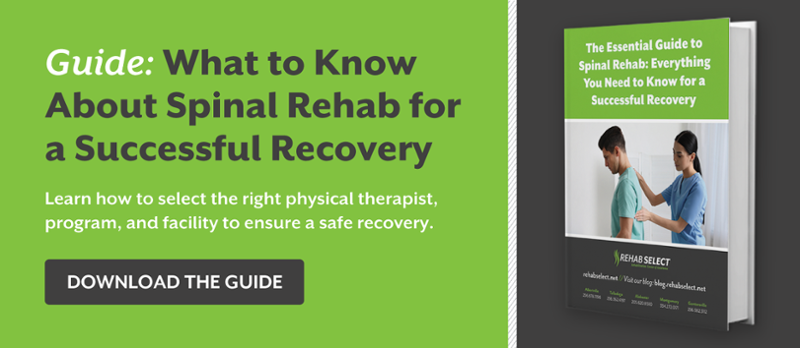
Michel Roccati’s spinal cord was severed in a motorbike accident in 2017, leaving him paralyzed from the waist down. However, after doctors attached electrodes to his spine, Michel became the first ever full spinal cord lesion patient to start walking again.
The technology that helped Michel is still being tested and not yet available on the market. But it wasn’t just the implant that got him back on his feet. His success resulted from his own determination, his positive outlook, and the rehabilitation therapy provided by his care team.
And if you’ve had spinal surgery, that same determination, positive outlook, and rehabilitation therapy are also your best bet for a successful recovery.
When will spinal surgery recovery begin?
The greatest improvements are made in the first six months following a spinal operation. So therapy and rehabilitation should start as soon as possible after the operation, followed by the swift introduction of a coordinated inpatient spinal rehab program.
The kind of prompt therapy provided by rehab specialists reduces your chance of experiencing chronic pain, disability, or surgical complications.
Spinal surgery care therapists
A good rehab facility will provide a multidisciplinary orthopedic care team who are experienced in caring for spinal surgery patients. This team may include:
- Counselors
- Doctors specialized in rehabilitation (physiatrists)
- Nurses
- Nutritionists
- Occupational therapists
- Physical therapists
- Psychologists
- Recreational therapists
- Rehabilitation nurses
- Social workers
Together, these professionals will design a therapy plan that takes into account your individual circumstances, needs, and objectives. They will monitor your recovery and fine-tune the plan as you progress. Look for a facility with a low patient-to-staff ratio to ensure you receive the best care and attention.
A good therapist will form a strong and trusting relationship with you and your loved ones. They should explain the best recovery and coping strategies, outline how the treatment program will develop, and answer any questions you might have. Your therapist may also warn you against certain activities, so it’s important to pay attention to this advice to speed up your recovery.
What kinds of therapy improve spinal surgery care?
Patients recovering from spinal surgery in an inpatient rehab facility are treated with orthopedic therapy that may involve a combination of physical therapy, occupational therapy, speech therapy, and mental health therapies.
Orthopedic therapy can help:
- Improve the outcome of your operation
- Increase your quality of life
- Accelerate your healing
- Overcome any musculoskeletal problems caused by your injury or surgery
- Gain range of motion in your arms and legs
- Use any necessary assistive equipment like a wheelchair, leg braces, or walkers
- Reduce and manage any pain you experience
- Recover communication skills, such as speaking, writing, or typing
Let’s look at the main types of orthopedic therapy you may encounter during spinal surgery care.
Physical therapy after spinal surgery
Physical therapy is perhaps the biggest part of any spinal surgery recovery program. It should start in the hospital and continue at an inpatient rehab center. At Rehab Select we offer inpatient orthopedic rehab programs for patients recovering from spinal surgery in Alabama.
The aim is to speed healing, reduce risks, and recover as much mobility as possible by strengthening the muscles, bones, and joints you will need to use in your day-to-day life going forward.
How physical therapy helps after spinal surgery
Your physiotherapist will examine you and assess your needs by asking questions about your ability to move, your pain level, and your medical history. They may give you a quick test to check how easily you can bend, grasp, move, reach, and walk. This will let them work out a plan for your therapy.
Initial physical therapy will concentrate on building up strength in the neck and back muscles through twisting or bending exercises. Later, therapy will move on to stretching and cardiovascular activities.
A good physical therapist will make use of various techniques, games, and gadgets to make the process as interesting and motivating as possible for you. During physical therapy, you should also expect to practice the movements of specific everyday activities like:
- Getting up and out of a bed or a chair
- Standing and maintaining balance
- Walking with or without an aid
- Going up and down stairs
- Getting into or out of a car
Because everyone has their own lifestyle, it’s a good idea to talk to your therapist about your normal routine and what you need to be able to do after your recovery. This will allow your therapist to work out what exercises and activities will be most useful for you in the long run.
Physical therapy after spinal surgery can also offer patients pain management techniques like electrotherapy, massage, thermotherapy, and ultrasound.
Occupational therapy after spinal surgery
Occupational therapy is another important part of spinal surgery care intended to help patients recover their independence. ‘Occupational’ refers to activities that you do every day including work or leisure activities. Unlike physical therapy, occupational therapy focuses on the whole person rather than just a specific problem.
It focuses on regaining the fine motor control needed for typical daily tasks like:
- Bathing
- Cooking
- Dressing
- Eating
- Housework
- Navigating your home
- Playing games or sports
- Social interaction
- Studying
- Working
Your occupational therapist will help you relearn how to do all of these essential activities and, if your condition limits your mobility, they will work with you to find another way you can do them so you can live your life with as few restrictions as possible.
Speech therapy after spinal surgery
Some patients will experience difficulty swallowing following spinal surgery. Many recover this ability within a few days of their operation, but others can still suffer problems for weeks or months afterward. Trouble swallowing can make eating a difficult and unpleasant experience and can also affect breathing.
Patients who do not quickly regain swallowing control will be referred to a speech therapist for diagnosis and treatment.
Another side effect of spinal surgery may be changes in your voice. Again, this symptom should clear up for most people within a few days. If you experience a weak or hoarse voice or lose it completely for a prolonged period, you may benefit from speech therapy.
Mental health therapies after spinal surgery
While most people mainly associate spinal surgery care with physical problems and treatments, spinal surgery recovery has a significant mental health aspect too.
A spinal injury can be a traumatic experience and the surgery and rehabilitation process that follow may be tough going at times.
Patients can face mental health issues such as post-traumatic stress disorder (PTSD), depression, anxiety, and even cognitive problems.
A good inpatient orthopedic rehab program should provide psychological counseling to support you throughout your recovery. Mental health solutions like cognitive behavioral therapy (CBT), psychotherapy, and counseling can prevent conditions like depression from developing in the first place. Your rehab program should also offer you specific techniques to deal with stress, pain, reduced mobility, and altered life circumstances.
The best rehab therapy after spinal surgery in Alabama
The most effective rehabilitation starts as soon as possible after surgery. At Rehab Select we can provide inpatient orthopedic therapy after your surgery and get you back to what you love doing sooner rather than later.
We are proud of our multidisciplinary teams of surgical rehab therapists, counselors, and support specialists. They’ll work together around the clock to ensure you can speedily and safely recover your health and independence.
If you need support following spinal surgery in Alabama, click here to schedule a meeting or tour of your nearest facility.





